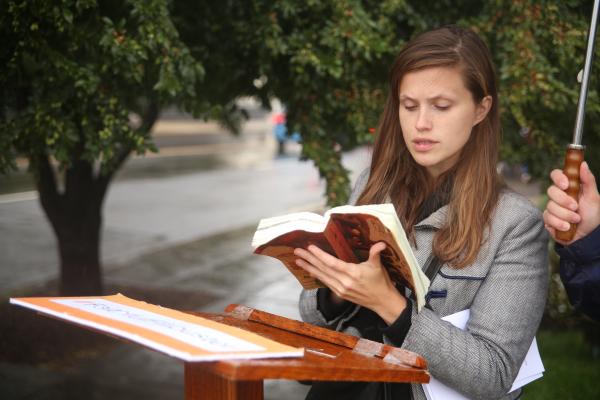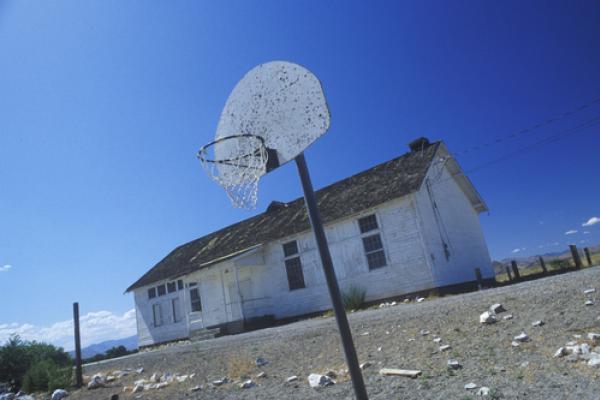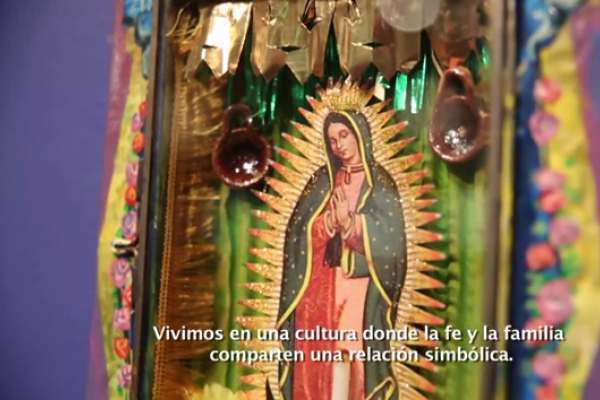When Dordt College graduates Jordan Harmelink and Rachel Tennant said “I do” at their July wedding, they joined the masses of graduates who meet their spouse at private Christian colleges.
According to an analysis by Facebook, of the top 25 colleges where men are most likely to meet their spouse, all are private Christian institutions. For women, more than half (64 percent) of the top 25 colleges where they’re likely to find a husband are religious schools.
The 12 schools that appear on both lists: They’re all Christian colleges.
Setting an away email with no date of return was almost as odd as leaving work and not and knowing when I’d be back. This unexpected time off gave me the opportunity to do everything on my to-do list and spend ridiculous amounts of time at the dog park. Naturally, it also gave me time to catch up on reading and visiting with other furloughed friends. But this past Wednesday I was beginning to feel a bit hopeless about the whole situation.
Scrolling through Facebook I noticed Sojourners updates on its #FaithfulFilibuster and it truly made me ashamed of my hopelessness. I was ashamed because I forgot who was in charge. I was ashamed because I forgot where my hope lies. And I was ashamed because I was so wrapped up in my own struggles of furlough I forgot about the families that were already struggling and now also dealing with a loss of paychecks.
On Thursday I saw another update from Sojourners, and despite the rain, I felt compelled to go check it out. I expected to do nothing but observe and admire faith leaders stepping out to reclaim hope and speak for the millions of silenced voices in this country. However, when I arrived, something different happened. I was asked if I wanted to participate, handed a Bible, and stepped to the podium to read.
Creator of the Universe preserve us from our own presumption. Do not let us close ourselves into ourselves, but open us continually into you. Let us be more in love with You than with our notions of You. Let us stop claiming to know everything so that we may understand something. Amen.
-Rabia Terri Harris
I love October. As a teacher, it was that time of year where rhythms were becoming established and the seeds of learning were beginning to sprout. In ministry, it is the time where I find myself riding the waves of my student’s school schedules in an effort to connect and converse. In either case, education, shapes not on the schedule of my life but the purpose.
As I breathe in the crisp autumn breeze, it reminds me to consider the larger partnership between the educators and the church. When we, as ministers and church leaders, consider what role education plays in the life of the church, we have to consider the active part of the church in the education of not only the church community, but its larger context.
Education, in the public context, is a constant topic of political struggle and strife. Education, in the ecclesial context, in its best is in-depth Bible study and at its worst is education by osmosis and observation. What is the call or consideration of the church to the topic of education? What role does the church have in the education of the community?
Most Americans share a common understanding that many public schools in poor neighborhoods aren’t great. It’s rare that I engage anyone who doesn’t know this basic fact on some level. But what’s less common is a deeper understanding of the extent of the problem. And sadly, even less common than that? Finding individuals who express a deep conviction that educational inequity can be eliminated. Faith communities are poised to add our voices to this much-needed conversation.
Fifteen million children live in poverty in the United States. Given poverty’s impact, many of these children already face additional challenges in their lives. For many young people, education can be “the great equalizer.” A high quality school can provide students with the necessary foundation to go to college and have a variety of opportunities opened to them. Poverty can become a thing of the past. But students growing up in poverty are more likely to attend low-performing public schools. In fact, only 22 percent of children who have lived in poverty do not graduate from high school. Only 9 percent receive college diplomas. And, not surprisingly, given our nation’s historical intersection of racial injustice and poverty, African American, Latino, and Native American students experience some of the nation’s biggest educational inequities.
Over the last few years we have heard much about the school to prison pipeline. According to the ACLU, it is:
a disturbing national trend wherein children are funneled out of public schools and into the juvenile and criminal justice systems. Many of these children have learning disabilities or histories of poverty, abuse or neglect, and would benefit from additional educational and counseling services. Instead, they are isolated, punished and pushed out.
The Children’s Defense Fund argues that because of a lack of early childhood education and healthy beginnings, this epidemic begins before a child is old enough to enroll in school, defining the problem as the Cradle to Prison pipeline. Organizations such as the Advancement Project, the Legal Defense Fund, and many others too have defined the school-to-prison pipeline as just another level to the mass incarceration epidemic and one of the most disturbing injustices we face today.
We know that the pipeline is undergirded by Zero Tolerance policies, mass expulsions, unprecedented school arrests, inadequate school funding, and myriad other unjust policies that either criminalize our children or rob them of the resources they need to be successful. We also know that high-school dropout is certainly a station on the pipeline. In many urban centers the dropout rate hovers around 50 percent, and some data suggests 7,000 students drop out of school every day. What happens to kids that drop out of school? Where do kids who are expelled end up?
As online worship becomes more common in some churches, leaders within the United Methodist Church are debating whether the denomination should condone online Communion.
About 30 denominational leaders met last week after Central United Methodist Church in Concord, N.C., announced plans to launch an online campus that potentially would offer online Communion. Some nondenominational churches already offer online Communion, according to United Methodist News Service, but leaders urged the denomination’s bishops to call for a moratorium on the practice and do further study of online ministries.
The majority of the leaders agreed with the statement that Communion “entails the actual tactile sharing of bread and wine in a service that involves people corporeally together in the same place.” Not everyone, however, agreed that congregants must be in the same place.
As a boy growing up, Joanna Maria Cifredo wasn’t like her brothers.
“My brothers looked at females because they wanted to be with a female,” Cifrado says, in new video resource by the Human Rights Campaign that premiered Oct. 1. “I looked at females more like, ‘Oh, I wish I was her.’ ”
Now, Joanna has decided to physically identify as a woman full time.
Her voice joined many others in Before God: We are All Family, a new film focused on the experiences of Latina LGBT people. She also participated, along with her mother Maria Vega-Cifredo, in a discussion panel that included the filmmaker at the first public viewing of the resource at the GALA Hispanic Theater in Washington, D.C.
Focusing on the important role family and faith play in Latino communities, the video resource is the newest component to a bilingual discussion guide produced by the HRC and the National Latina/o LGBT Human Rights Organization, among others. The organizations developed the guide with the aim of helping Latinos have a conversation about faith and LGBT inclusion.
The guide, written by Rev. Dr. Miguel A. de la Torre, with help from Rev. Dr. Ignacio Castuera and Lisbeth Melendéz Rivera, gathers 14 testimonies into six chapters, each with stories, questions, and exercises focused on what it means to be LGBT and Latina. Inside the guide, created in 2011, are sections on family, the gift of our bodies, the Bible, and solidarity.






